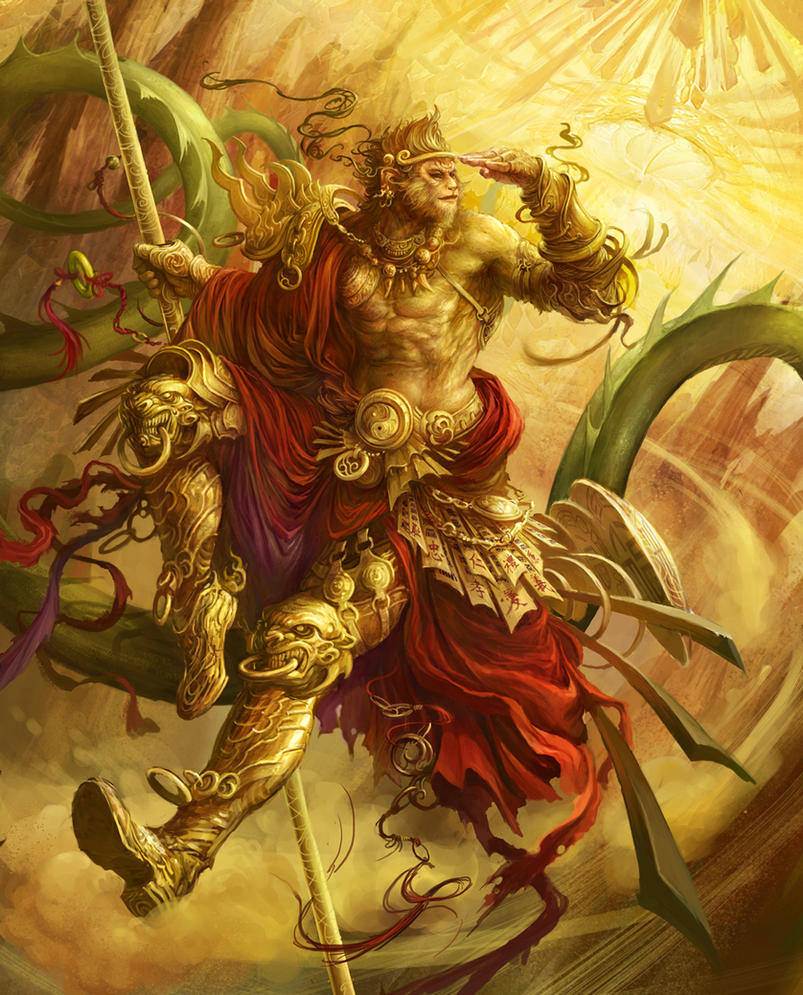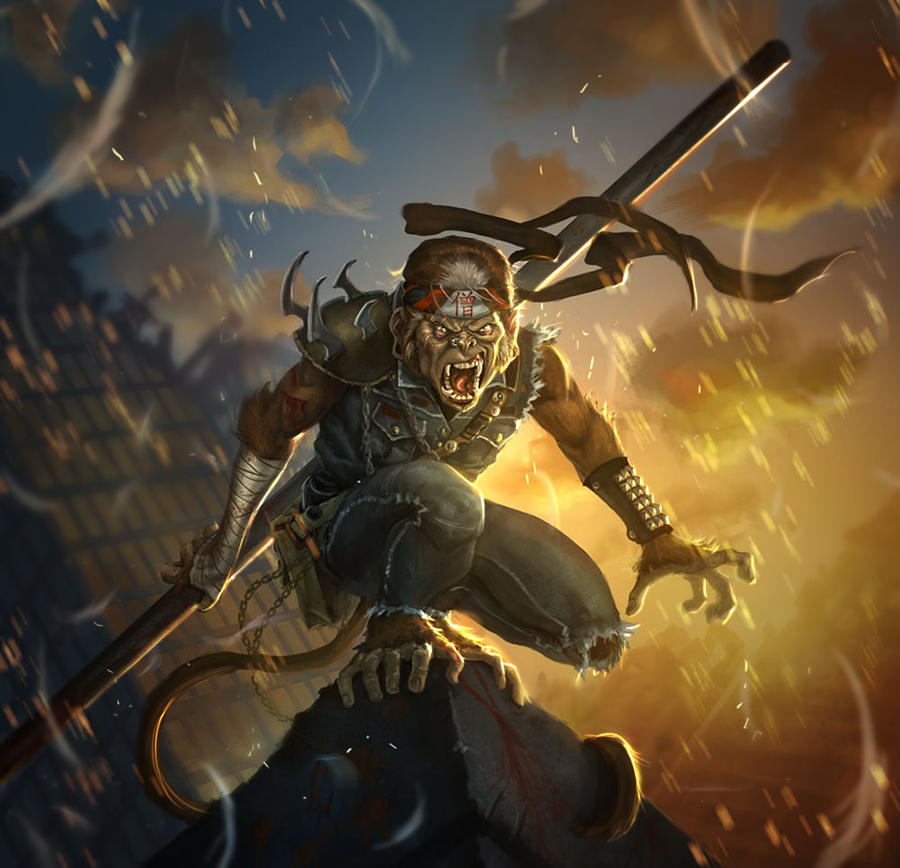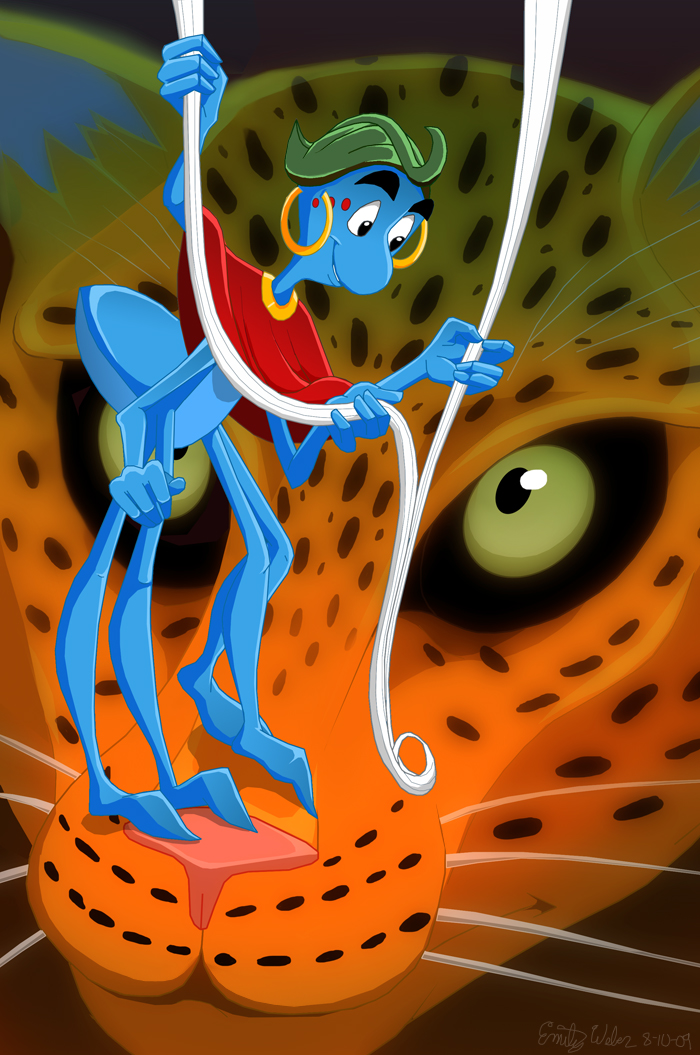When I left off last week, the Monkey King, a hero of Chinese
mythology, was making mischief. Sun Wukong had defeated many
immortals in combat. In addition, he had traveled to the underworld
and crossed out the name of every monkey from the register of the
dead, giving hell no claim over him. Reports were reaching the Jade
Emperor of the Monkey King's exploits, and something had to be
done...
In point of fact, the Monkey King had already been causing an
enormous headache for the Jade Emperor. When the emissaries from the
underworld approached the chief deity to complain about Sun Wukong's
latest exploits, it was the straw which broke the camel's back. The
Jade Emperor sent out a summons for the Monkey King, asking him to
come to heaven and appear before the Jade Emperor himself.
Sun Wukong leapt upon the opportunity to enter heaven. Once there, he was thrilled to be offered a position among the gods by the Jade Emperor himself! The Monkey King was gifted the title of “Keeper of the Heavenly Stables”, and asked to look after the heaven's horses. He took his responsibility very seriously (or, at least, as seriously as the Monkey King took anything).
However, the title was a sham. In truth, the Jade Emperor merely
wished to keep the Monkey King in heaven where he was close at hand,
and easier to keep an eye on. Though Sun Wukong imagined himself the
equal of the gods with his new, fancy title, he was little more than
a glorified stable boy.
Eventually, the Monkey King realized that his title counted for
nothing. Enraged, he stormed into the Jade Emperor's court. Sun
Wukong declared that he would no longer be the Keeper of the Heavenly
Stables. Instead, he wanted a new title, one that made him the equal
of the gods. The Monkey King declared himself the “Great Sage,
Equal of Heaven”. When the Monkey King defeated several of
heaven's greatest warriors in combat, the gods were forced to
recognize his new title.
Still, the Jade Emperor tried to keep the Monkey King uninvolved with heavenly affairs. He tasked him with guarding the gardens in which grow the peaches of immortality.
In hindsight, this was not the wisest choice.
I don't know how many of you have fruit trees growing near you. I have a citrus tree in my backyard. When it blooms in the spring, as it's doing now, it smells absolutely divine. Almost as good as the flower blossoms are the ripe fruits sitting in the hot summer air. It's a tantalizing smell which makes me crave citrus. Most fresh fruits are the same: lemons, cherries...peaches.
You see where this is going?
The Monkey King was on duty guarding the gardens one day when the smell overwhelmed him. He couldn't resist; he just had to sink his teeth into a juicy peach. And why stop with just one? By the time Sun Wukong was beginning to feel sated, most of the ripe fruits had been devoured.
Unfortunately, this was about the time when a group of heavenly
maidens appeared to harvest the fruits.
Great timing, right?
The women were infuriated that the stupid monkey had eaten the peaches of immortality. As they ranted at him, they unintentionally let slip that the peaches were needed for a fancy banquet taking place later that afternoon. All of the high-ranking gods had been invited...but the Monkey King had not received an invitation.
He wasn't too pleased about that. In fact, he was furious.
Sun Wukong incapacitated the heavenly maidens and immediately set out for the banquet. He arrived before the other guests and found all of the food laid out. The Monkey King set to work.
He ate the peaches of immortality. He swallowed the pills of longevity. He drank the Emperor's wine. The Monkey King worked his way up and down the banquet table, sampling anything and everything – whatever he felt like.
When the Jade Emperor saw the mess that Sun Wukong had made of the banquet, his patience was at an end. He commanded the armies of heaven to subdue the Monkey King. Though he was perfectly capable of defeating several opponents at once, Sun Wukong was hopelessly outnumbered.
But the Monkey King had some tricks up his sleeves (fur?). He plucked a hair from his tail, blew on it, and whispered a word. The hair immediately transformed into a copy of the monkey. He repeated this trick with a whole handful of hairs, and soon Sun Wukong himself was standing back, watching the armies of heaven fight his copies.
The battle went on for some time, but eventually a great Bodhisattva (the title for a prestigious follower of Buddha, one who has achieved enlightenment but has chosen to remain on earth rather than enter nirvana, in order to help guide others to enlightenment) was able to render him unconscious.
The Jade Emperor demanded that the Monkey King be killed, but that was impossible. Born from stone, his skin had already been tough. Between all of the peaches he had eaten and the pills of longevity he had consumed, Sun Wukong was pretty much invincible.
One of the gods suggested that Sun Wukong be locked in a cage and slowly burned. Fire would still be an effective tool against the monkey, and his ashes could be used to recreate the pills of longevity for the gods to consume. This plan was agreed to. However, Sun Wukong woke up partway through the process and escaped the cage. Thoroughly fed up with heaven, he made his escape.
By now the Jade Emperor was filled with wrath at the mere thought of the Monkey King. Something had to be done to stop him! However, his own forces had scarcely been enough to knock Sun Wukong unconscious the first time. In order to stop the monkey, he would need help from a force even more powerful...












